Strategic Planning and Analysis: The Waldorf Hilton Report
VerifiedAdded on 2023/01/06
|11
|3752
|73
Report
AI Summary
This report delves into strategic planning within the hospitality industry, using The Waldorf Hilton as a case study. It examines crucial factors for strategy implementation, including dedicated resources, market positioning, workforce management, and commitment. The report explores creative business strategies, such as innovation, enhanced guest services, and competitive pricing, to gain a competitive edge. It then addresses performance metrics vital for assessing success. The report covers the dynamic nature of the hospitality industry, emphasizing the need for hotels to adapt and innovate to satisfy customer expectations and achieve operational excellence. The Waldorf Hilton's franchising strategy is analyzed alongside its approach to customer satisfaction and market positioning, providing a comprehensive overview of strategic planning in this sector.
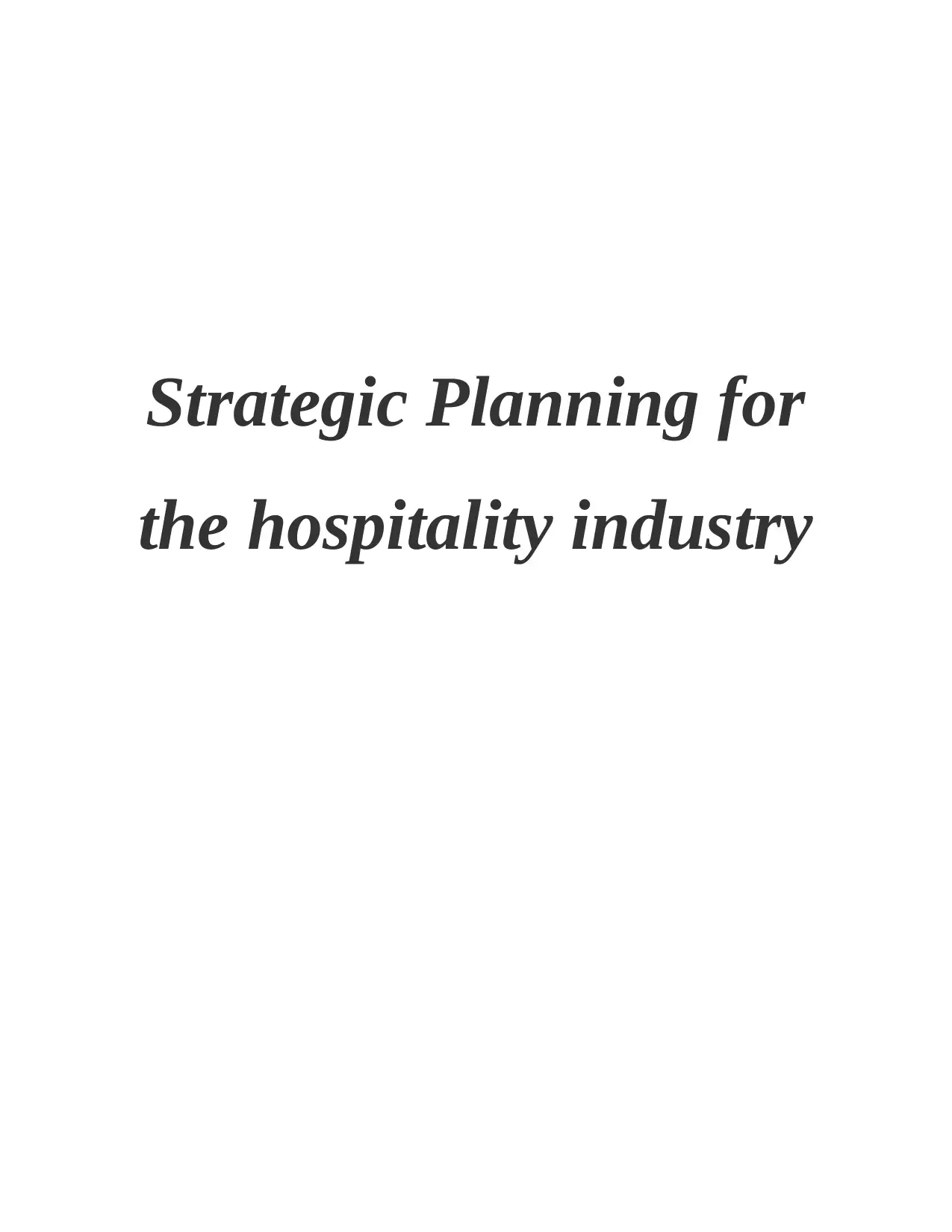
Strategic Planning for
the hospitality industry
the hospitality industry
Paraphrase This Document
Need a fresh take? Get an instant paraphrase of this document with our AI Paraphraser
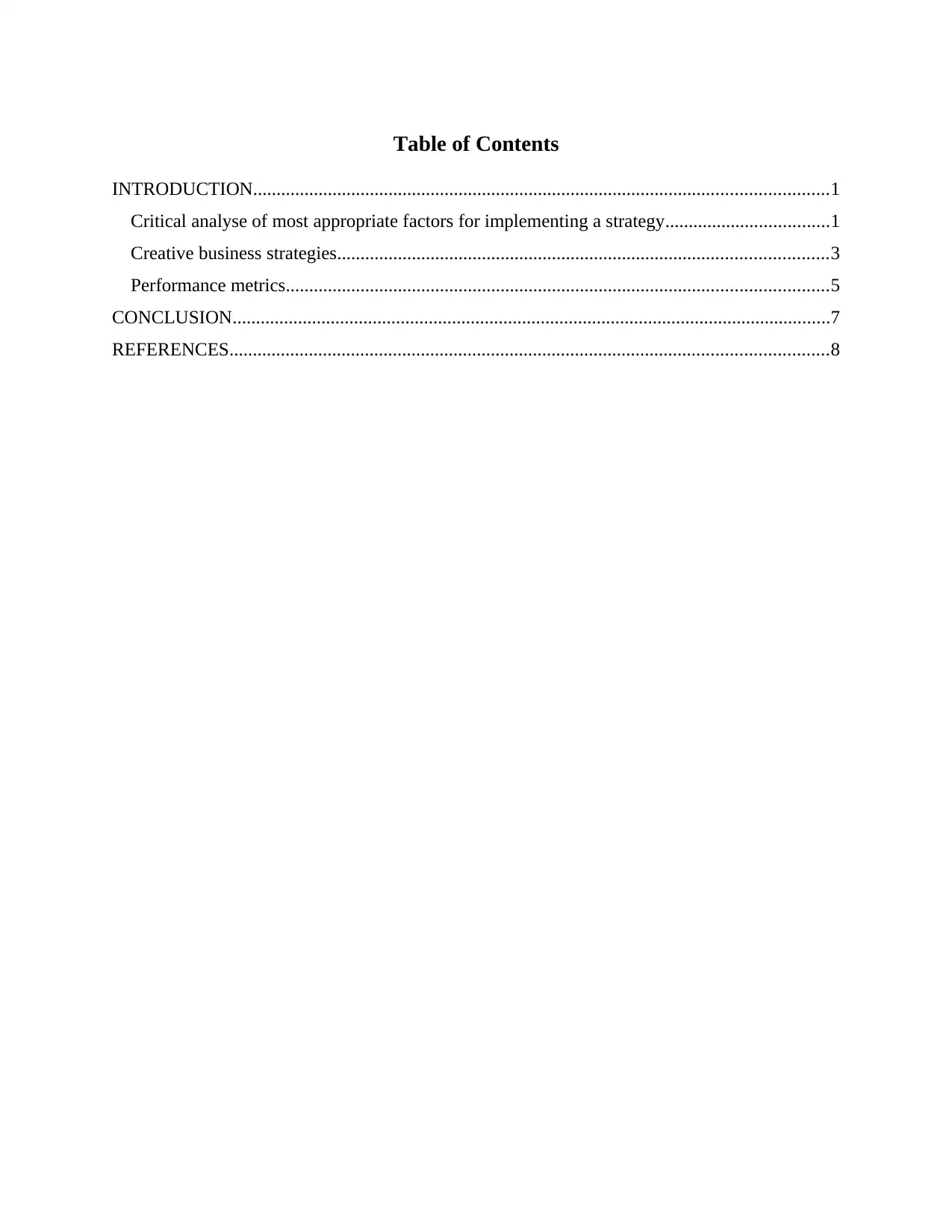
Table of Contents
INTRODUCTION...........................................................................................................................1
Critical analyse of most appropriate factors for implementing a strategy...................................1
Creative business strategies.........................................................................................................3
Performance metrics....................................................................................................................5
CONCLUSION................................................................................................................................7
REFERENCES................................................................................................................................8
INTRODUCTION...........................................................................................................................1
Critical analyse of most appropriate factors for implementing a strategy...................................1
Creative business strategies.........................................................................................................3
Performance metrics....................................................................................................................5
CONCLUSION................................................................................................................................7
REFERENCES................................................................................................................................8

INTRODUCTION
Strategy is considered as the wide term that tends to undertake the effective guidance and
direction to company that is helpful for management in terms of prominent functioning of
company. It is essential for company to consider the effective position and also develop
signifiant planning for effective support to accomplish business objectives and goals. Strategic
planning is the continuous procedure that tends to develop prominent documentation for the
small business which is useful in terms of operating business effectively (Elbanna, 2016). It is
useful in developing effective business ideas and thoughts in terms of fostering entrepreneurship
to contribute in growth and success. This report is based on The Waldorf Hilton as hotel offer
effective quality of foods and services to their customers and also need to consider the prominent
changes in bringing new technology for maintaining competitive advantage. It tends to cover
effective factors like creation of business strategies in terms of becoming more competitive in
hospitality sector and performance metrics is useful for effectively measuring performance.
Critical analyse of most appropriate factors for implementing a strategy
Strategic planning is considered as the continuous procedure that need effective thoughts
and opinions for signifiant planning considering the part of higher level of management which is
useful in enhancing the overall performance of company and profitability. It is essential for
company to identify the suitable demand of customers and offer products which is useful in
achieving effective brand image by increasing sales (Bryson, Edwards and Van Slyke, 2018).
Moreover, The Waldorf Hilton is the franchisee of Hilton hotel group that offer wide range of
qualitative services to their guests. At the time of executing franchising strategy, prominent
factors are useful and undertaken by managers. For this, signifiant factors are used for
franchising strategy is mentioned as: Dedicated resources: In terms of becoming more successful at the time of executing
strategy, dedicated resources are the most effective factor. For this, resources are the
effective kind of personal talent and outside supply that is useful for effective support and
help. The prominent sources which are useful in executing strategy consider intellectual
resources, HR, finance and many more. At the time of executing franchising strategy,
effective factors are considered by managers of The Waldorf Hilton as they provide
significant options that tends to eliminate cost by offer suitable return in stipulated period
1
Strategy is considered as the wide term that tends to undertake the effective guidance and
direction to company that is helpful for management in terms of prominent functioning of
company. It is essential for company to consider the effective position and also develop
signifiant planning for effective support to accomplish business objectives and goals. Strategic
planning is the continuous procedure that tends to develop prominent documentation for the
small business which is useful in terms of operating business effectively (Elbanna, 2016). It is
useful in developing effective business ideas and thoughts in terms of fostering entrepreneurship
to contribute in growth and success. This report is based on The Waldorf Hilton as hotel offer
effective quality of foods and services to their customers and also need to consider the prominent
changes in bringing new technology for maintaining competitive advantage. It tends to cover
effective factors like creation of business strategies in terms of becoming more competitive in
hospitality sector and performance metrics is useful for effectively measuring performance.
Critical analyse of most appropriate factors for implementing a strategy
Strategic planning is considered as the continuous procedure that need effective thoughts
and opinions for signifiant planning considering the part of higher level of management which is
useful in enhancing the overall performance of company and profitability. It is essential for
company to identify the suitable demand of customers and offer products which is useful in
achieving effective brand image by increasing sales (Bryson, Edwards and Van Slyke, 2018).
Moreover, The Waldorf Hilton is the franchisee of Hilton hotel group that offer wide range of
qualitative services to their guests. At the time of executing franchising strategy, prominent
factors are useful and undertaken by managers. For this, signifiant factors are used for
franchising strategy is mentioned as: Dedicated resources: In terms of becoming more successful at the time of executing
strategy, dedicated resources are the most effective factor. For this, resources are the
effective kind of personal talent and outside supply that is useful for effective support and
help. The prominent sources which are useful in executing strategy consider intellectual
resources, HR, finance and many more. At the time of executing franchising strategy,
effective factors are considered by managers of The Waldorf Hilton as they provide
significant options that tends to eliminate cost by offer suitable return in stipulated period
1
⊘ This is a preview!⊘
Do you want full access?
Subscribe today to unlock all pages.

Trusted by 1+ million students worldwide
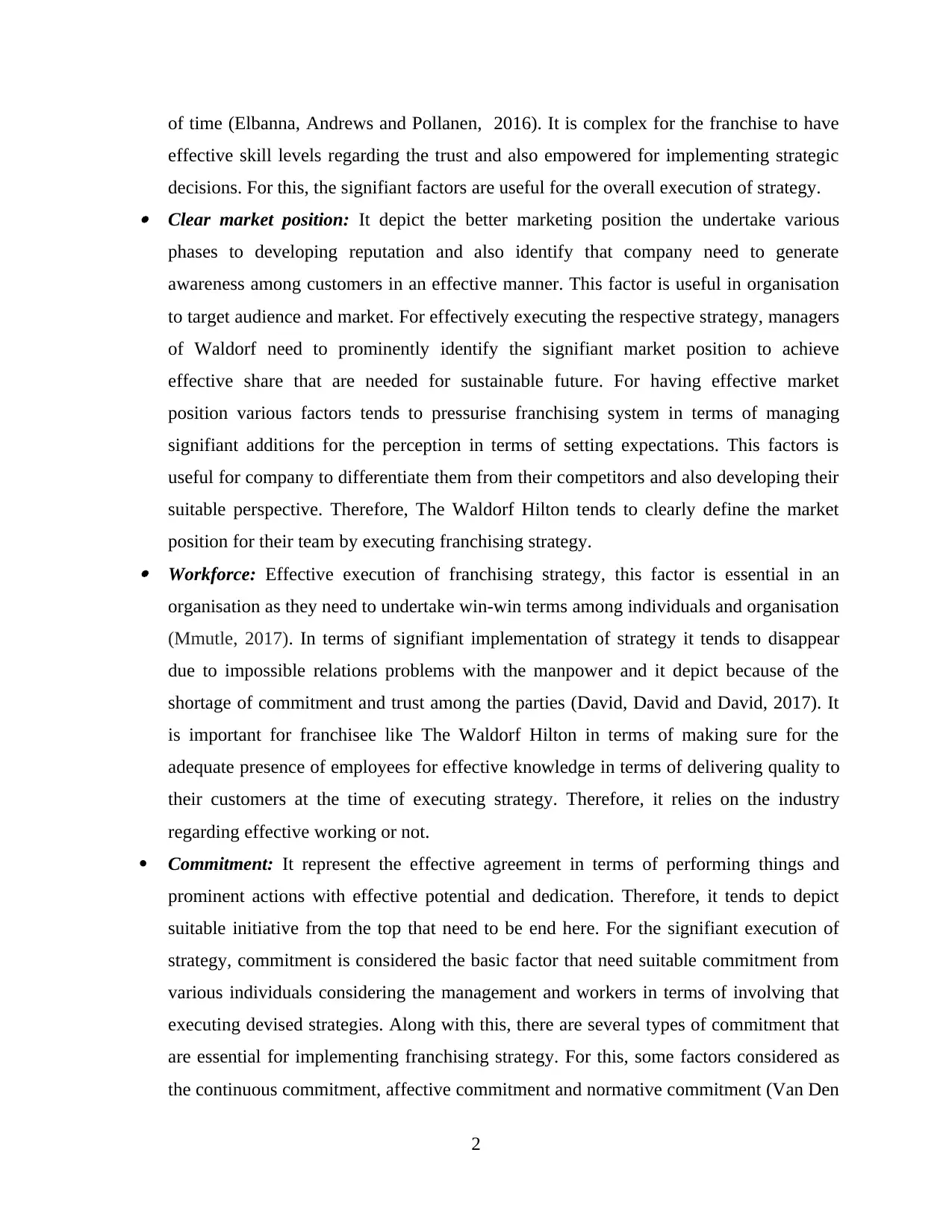
of time (Elbanna, Andrews and Pollanen, 2016). It is complex for the franchise to have
effective skill levels regarding the trust and also empowered for implementing strategic
decisions. For this, the signifiant factors are useful for the overall execution of strategy. Clear market position: It depict the better marketing position the undertake various
phases to developing reputation and also identify that company need to generate
awareness among customers in an effective manner. This factor is useful in organisation
to target audience and market. For effectively executing the respective strategy, managers
of Waldorf need to prominently identify the signifiant market position to achieve
effective share that are needed for sustainable future. For having effective market
position various factors tends to pressurise franchising system in terms of managing
signifiant additions for the perception in terms of setting expectations. This factors is
useful for company to differentiate them from their competitors and also developing their
suitable perspective. Therefore, The Waldorf Hilton tends to clearly define the market
position for their team by executing franchising strategy. Workforce: Effective execution of franchising strategy, this factor is essential in an
organisation as they need to undertake win-win terms among individuals and organisation
(Mmutle, 2017). In terms of signifiant implementation of strategy it tends to disappear
due to impossible relations problems with the manpower and it depict because of the
shortage of commitment and trust among the parties (David, David and David, 2017). It
is important for franchisee like The Waldorf Hilton in terms of making sure for the
adequate presence of employees for effective knowledge in terms of delivering quality to
their customers at the time of executing strategy. Therefore, it relies on the industry
regarding effective working or not.
Commitment: It represent the effective agreement in terms of performing things and
prominent actions with effective potential and dedication. Therefore, it tends to depict
suitable initiative from the top that need to be end here. For the signifiant execution of
strategy, commitment is considered the basic factor that need suitable commitment from
various individuals considering the management and workers in terms of involving that
executing devised strategies. Along with this, there are several types of commitment that
are essential for implementing franchising strategy. For this, some factors considered as
the continuous commitment, affective commitment and normative commitment (Van Den
2
effective skill levels regarding the trust and also empowered for implementing strategic
decisions. For this, the signifiant factors are useful for the overall execution of strategy. Clear market position: It depict the better marketing position the undertake various
phases to developing reputation and also identify that company need to generate
awareness among customers in an effective manner. This factor is useful in organisation
to target audience and market. For effectively executing the respective strategy, managers
of Waldorf need to prominently identify the signifiant market position to achieve
effective share that are needed for sustainable future. For having effective market
position various factors tends to pressurise franchising system in terms of managing
signifiant additions for the perception in terms of setting expectations. This factors is
useful for company to differentiate them from their competitors and also developing their
suitable perspective. Therefore, The Waldorf Hilton tends to clearly define the market
position for their team by executing franchising strategy. Workforce: Effective execution of franchising strategy, this factor is essential in an
organisation as they need to undertake win-win terms among individuals and organisation
(Mmutle, 2017). In terms of signifiant implementation of strategy it tends to disappear
due to impossible relations problems with the manpower and it depict because of the
shortage of commitment and trust among the parties (David, David and David, 2017). It
is important for franchisee like The Waldorf Hilton in terms of making sure for the
adequate presence of employees for effective knowledge in terms of delivering quality to
their customers at the time of executing strategy. Therefore, it relies on the industry
regarding effective working or not.
Commitment: It represent the effective agreement in terms of performing things and
prominent actions with effective potential and dedication. Therefore, it tends to depict
suitable initiative from the top that need to be end here. For the signifiant execution of
strategy, commitment is considered the basic factor that need suitable commitment from
various individuals considering the management and workers in terms of involving that
executing devised strategies. Along with this, there are several types of commitment that
are essential for implementing franchising strategy. For this, some factors considered as
the continuous commitment, affective commitment and normative commitment (Van Den
2
Paraphrase This Document
Need a fresh take? Get an instant paraphrase of this document with our AI Paraphraser
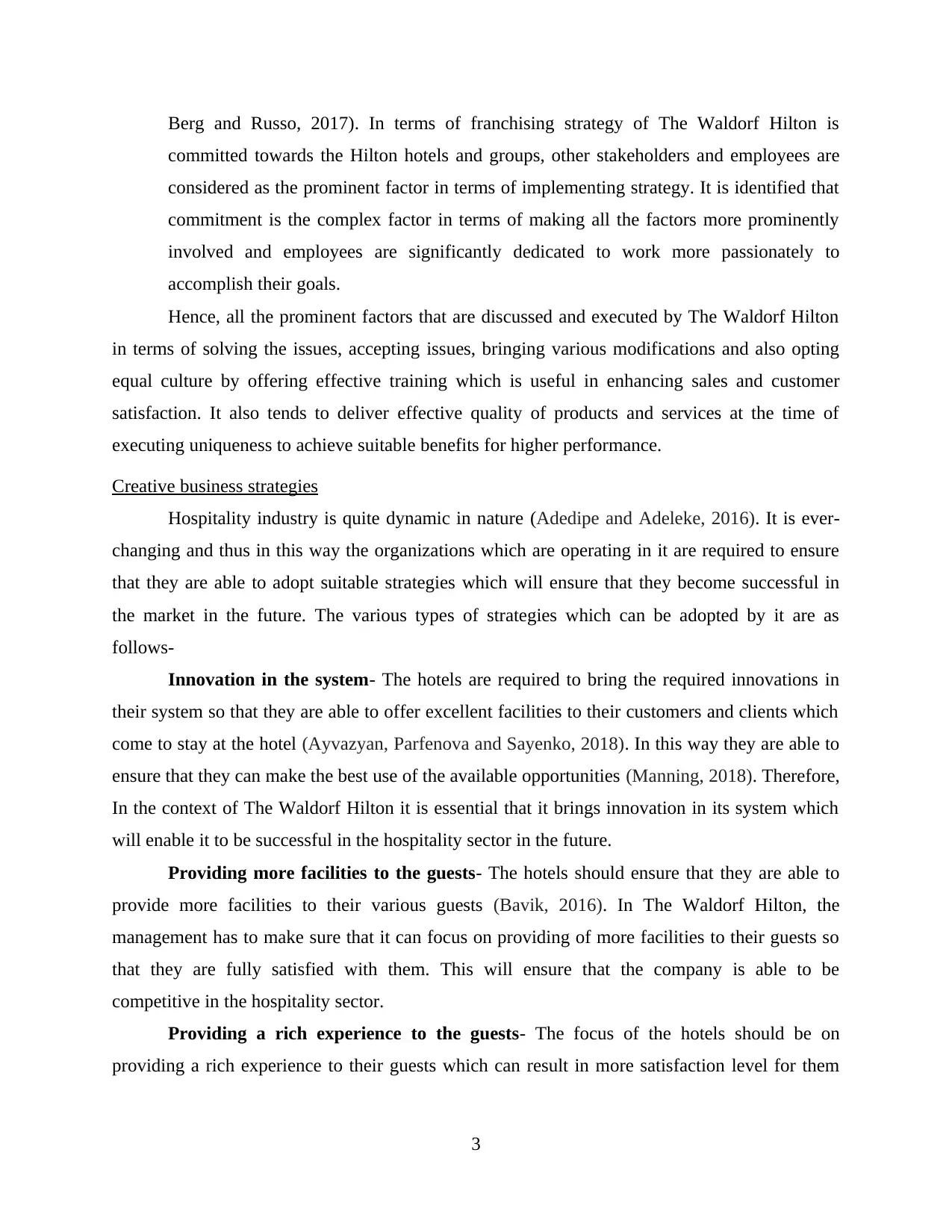
Berg and Russo, 2017). In terms of franchising strategy of The Waldorf Hilton is
committed towards the Hilton hotels and groups, other stakeholders and employees are
considered as the prominent factor in terms of implementing strategy. It is identified that
commitment is the complex factor in terms of making all the factors more prominently
involved and employees are significantly dedicated to work more passionately to
accomplish their goals.
Hence, all the prominent factors that are discussed and executed by The Waldorf Hilton
in terms of solving the issues, accepting issues, bringing various modifications and also opting
equal culture by offering effective training which is useful in enhancing sales and customer
satisfaction. It also tends to deliver effective quality of products and services at the time of
executing uniqueness to achieve suitable benefits for higher performance.
Creative business strategies
Hospitality industry is quite dynamic in nature (Adedipe and Adeleke, 2016). It is ever-
changing and thus in this way the organizations which are operating in it are required to ensure
that they are able to adopt suitable strategies which will ensure that they become successful in
the market in the future. The various types of strategies which can be adopted by it are as
follows-
Innovation in the system- The hotels are required to bring the required innovations in
their system so that they are able to offer excellent facilities to their customers and clients which
come to stay at the hotel (Ayvazyan, Parfenova and Sayenko, 2018). In this way they are able to
ensure that they can make the best use of the available opportunities (Manning, 2018). Therefore,
In the context of The Waldorf Hilton it is essential that it brings innovation in its system which
will enable it to be successful in the hospitality sector in the future.
Providing more facilities to the guests- The hotels should ensure that they are able to
provide more facilities to their various guests (Bavik, 2016). In The Waldorf Hilton, the
management has to make sure that it can focus on providing of more facilities to their guests so
that they are fully satisfied with them. This will ensure that the company is able to be
competitive in the hospitality sector.
Providing a rich experience to the guests- The focus of the hotels should be on
providing a rich experience to their guests which can result in more satisfaction level for them
3
committed towards the Hilton hotels and groups, other stakeholders and employees are
considered as the prominent factor in terms of implementing strategy. It is identified that
commitment is the complex factor in terms of making all the factors more prominently
involved and employees are significantly dedicated to work more passionately to
accomplish their goals.
Hence, all the prominent factors that are discussed and executed by The Waldorf Hilton
in terms of solving the issues, accepting issues, bringing various modifications and also opting
equal culture by offering effective training which is useful in enhancing sales and customer
satisfaction. It also tends to deliver effective quality of products and services at the time of
executing uniqueness to achieve suitable benefits for higher performance.
Creative business strategies
Hospitality industry is quite dynamic in nature (Adedipe and Adeleke, 2016). It is ever-
changing and thus in this way the organizations which are operating in it are required to ensure
that they are able to adopt suitable strategies which will ensure that they become successful in
the market in the future. The various types of strategies which can be adopted by it are as
follows-
Innovation in the system- The hotels are required to bring the required innovations in
their system so that they are able to offer excellent facilities to their customers and clients which
come to stay at the hotel (Ayvazyan, Parfenova and Sayenko, 2018). In this way they are able to
ensure that they can make the best use of the available opportunities (Manning, 2018). Therefore,
In the context of The Waldorf Hilton it is essential that it brings innovation in its system which
will enable it to be successful in the hospitality sector in the future.
Providing more facilities to the guests- The hotels should ensure that they are able to
provide more facilities to their various guests (Bavik, 2016). In The Waldorf Hilton, the
management has to make sure that it can focus on providing of more facilities to their guests so
that they are fully satisfied with them. This will ensure that the company is able to be
competitive in the hospitality sector.
Providing a rich experience to the guests- The focus of the hotels should be on
providing a rich experience to their guests which can result in more satisfaction level for them
3
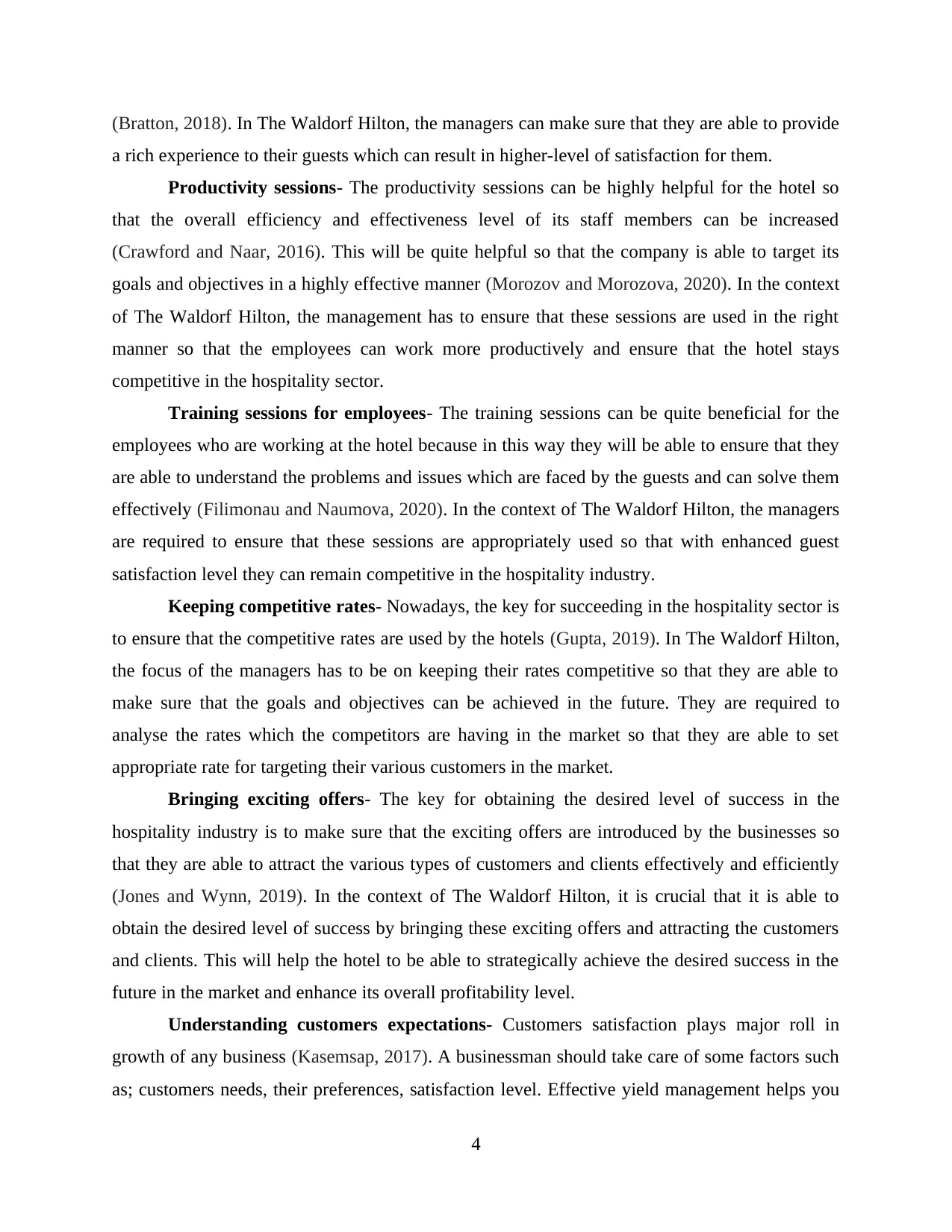
(Bratton, 2018). In The Waldorf Hilton, the managers can make sure that they are able to provide
a rich experience to their guests which can result in higher-level of satisfaction for them.
Productivity sessions- The productivity sessions can be highly helpful for the hotel so
that the overall efficiency and effectiveness level of its staff members can be increased
(Crawford and Naar, 2016). This will be quite helpful so that the company is able to target its
goals and objectives in a highly effective manner (Morozov and Morozova, 2020). In the context
of The Waldorf Hilton, the management has to ensure that these sessions are used in the right
manner so that the employees can work more productively and ensure that the hotel stays
competitive in the hospitality sector.
Training sessions for employees- The training sessions can be quite beneficial for the
employees who are working at the hotel because in this way they will be able to ensure that they
are able to understand the problems and issues which are faced by the guests and can solve them
effectively (Filimonau and Naumova, 2020). In the context of The Waldorf Hilton, the managers
are required to ensure that these sessions are appropriately used so that with enhanced guest
satisfaction level they can remain competitive in the hospitality industry.
Keeping competitive rates- Nowadays, the key for succeeding in the hospitality sector is
to ensure that the competitive rates are used by the hotels (Gupta, 2019). In The Waldorf Hilton,
the focus of the managers has to be on keeping their rates competitive so that they are able to
make sure that the goals and objectives can be achieved in the future. They are required to
analyse the rates which the competitors are having in the market so that they are able to set
appropriate rate for targeting their various customers in the market.
Bringing exciting offers- The key for obtaining the desired level of success in the
hospitality industry is to make sure that the exciting offers are introduced by the businesses so
that they are able to attract the various types of customers and clients effectively and efficiently
(Jones and Wynn, 2019). In the context of The Waldorf Hilton, it is crucial that it is able to
obtain the desired level of success by bringing these exciting offers and attracting the customers
and clients. This will help the hotel to be able to strategically achieve the desired success in the
future in the market and enhance its overall profitability level.
Understanding customers expectations- Customers satisfaction plays major roll in
growth of any business (Kasemsap, 2017). A businessman should take care of some factors such
as; customers needs, their preferences, satisfaction level. Effective yield management helps you
4
a rich experience to their guests which can result in higher-level of satisfaction for them.
Productivity sessions- The productivity sessions can be highly helpful for the hotel so
that the overall efficiency and effectiveness level of its staff members can be increased
(Crawford and Naar, 2016). This will be quite helpful so that the company is able to target its
goals and objectives in a highly effective manner (Morozov and Morozova, 2020). In the context
of The Waldorf Hilton, the management has to ensure that these sessions are used in the right
manner so that the employees can work more productively and ensure that the hotel stays
competitive in the hospitality sector.
Training sessions for employees- The training sessions can be quite beneficial for the
employees who are working at the hotel because in this way they will be able to ensure that they
are able to understand the problems and issues which are faced by the guests and can solve them
effectively (Filimonau and Naumova, 2020). In the context of The Waldorf Hilton, the managers
are required to ensure that these sessions are appropriately used so that with enhanced guest
satisfaction level they can remain competitive in the hospitality industry.
Keeping competitive rates- Nowadays, the key for succeeding in the hospitality sector is
to ensure that the competitive rates are used by the hotels (Gupta, 2019). In The Waldorf Hilton,
the focus of the managers has to be on keeping their rates competitive so that they are able to
make sure that the goals and objectives can be achieved in the future. They are required to
analyse the rates which the competitors are having in the market so that they are able to set
appropriate rate for targeting their various customers in the market.
Bringing exciting offers- The key for obtaining the desired level of success in the
hospitality industry is to make sure that the exciting offers are introduced by the businesses so
that they are able to attract the various types of customers and clients effectively and efficiently
(Jones and Wynn, 2019). In the context of The Waldorf Hilton, it is crucial that it is able to
obtain the desired level of success by bringing these exciting offers and attracting the customers
and clients. This will help the hotel to be able to strategically achieve the desired success in the
future in the market and enhance its overall profitability level.
Understanding customers expectations- Customers satisfaction plays major roll in
growth of any business (Kasemsap, 2017). A businessman should take care of some factors such
as; customers needs, their preferences, satisfaction level. Effective yield management helps you
4
⊘ This is a preview!⊘
Do you want full access?
Subscribe today to unlock all pages.

Trusted by 1+ million students worldwide
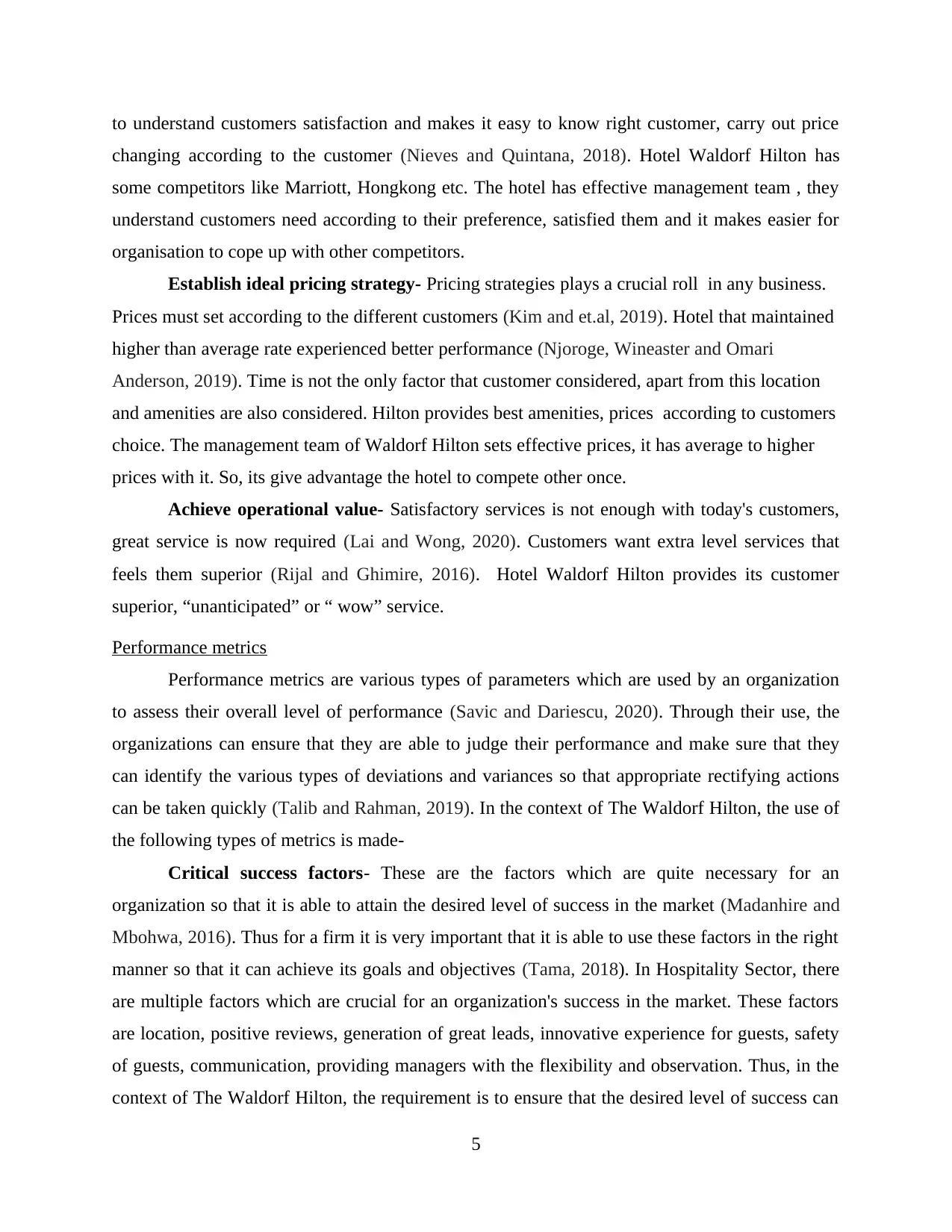
to understand customers satisfaction and makes it easy to know right customer, carry out price
changing according to the customer (Nieves and Quintana, 2018). Hotel Waldorf Hilton has
some competitors like Marriott, Hongkong etc. The hotel has effective management team , they
understand customers need according to their preference, satisfied them and it makes easier for
organisation to cope up with other competitors.
Establish ideal pricing strategy- Pricing strategies plays a crucial roll in any business.
Prices must set according to the different customers (Kim and et.al, 2019). Hotel that maintained
higher than average rate experienced better performance (Njoroge, Wineaster and Omari
Anderson, 2019). Time is not the only factor that customer considered, apart from this location
and amenities are also considered. Hilton provides best amenities, prices according to customers
choice. The management team of Waldorf Hilton sets effective prices, it has average to higher
prices with it. So, its give advantage the hotel to compete other once.
Achieve operational value- Satisfactory services is not enough with today's customers,
great service is now required (Lai and Wong, 2020). Customers want extra level services that
feels them superior (Rijal and Ghimire, 2016). Hotel Waldorf Hilton provides its customer
superior, “unanticipated” or “ wow” service.
Performance metrics
Performance metrics are various types of parameters which are used by an organization
to assess their overall level of performance (Savic and Dariescu, 2020). Through their use, the
organizations can ensure that they are able to judge their performance and make sure that they
can identify the various types of deviations and variances so that appropriate rectifying actions
can be taken quickly (Talib and Rahman, 2019). In the context of The Waldorf Hilton, the use of
the following types of metrics is made-
Critical success factors- These are the factors which are quite necessary for an
organization so that it is able to attain the desired level of success in the market (Madanhire and
Mbohwa, 2016). Thus for a firm it is very important that it is able to use these factors in the right
manner so that it can achieve its goals and objectives (Tama, 2018). In Hospitality Sector, there
are multiple factors which are crucial for an organization's success in the market. These factors
are location, positive reviews, generation of great leads, innovative experience for guests, safety
of guests, communication, providing managers with the flexibility and observation. Thus, in the
context of The Waldorf Hilton, the requirement is to ensure that the desired level of success can
5
changing according to the customer (Nieves and Quintana, 2018). Hotel Waldorf Hilton has
some competitors like Marriott, Hongkong etc. The hotel has effective management team , they
understand customers need according to their preference, satisfied them and it makes easier for
organisation to cope up with other competitors.
Establish ideal pricing strategy- Pricing strategies plays a crucial roll in any business.
Prices must set according to the different customers (Kim and et.al, 2019). Hotel that maintained
higher than average rate experienced better performance (Njoroge, Wineaster and Omari
Anderson, 2019). Time is not the only factor that customer considered, apart from this location
and amenities are also considered. Hilton provides best amenities, prices according to customers
choice. The management team of Waldorf Hilton sets effective prices, it has average to higher
prices with it. So, its give advantage the hotel to compete other once.
Achieve operational value- Satisfactory services is not enough with today's customers,
great service is now required (Lai and Wong, 2020). Customers want extra level services that
feels them superior (Rijal and Ghimire, 2016). Hotel Waldorf Hilton provides its customer
superior, “unanticipated” or “ wow” service.
Performance metrics
Performance metrics are various types of parameters which are used by an organization
to assess their overall level of performance (Savic and Dariescu, 2020). Through their use, the
organizations can ensure that they are able to judge their performance and make sure that they
can identify the various types of deviations and variances so that appropriate rectifying actions
can be taken quickly (Talib and Rahman, 2019). In the context of The Waldorf Hilton, the use of
the following types of metrics is made-
Critical success factors- These are the factors which are quite necessary for an
organization so that it is able to attain the desired level of success in the market (Madanhire and
Mbohwa, 2016). Thus for a firm it is very important that it is able to use these factors in the right
manner so that it can achieve its goals and objectives (Tama, 2018). In Hospitality Sector, there
are multiple factors which are crucial for an organization's success in the market. These factors
are location, positive reviews, generation of great leads, innovative experience for guests, safety
of guests, communication, providing managers with the flexibility and observation. Thus, in the
context of The Waldorf Hilton, the requirement is to ensure that the desired level of success can
5
Paraphrase This Document
Need a fresh take? Get an instant paraphrase of this document with our AI Paraphraser
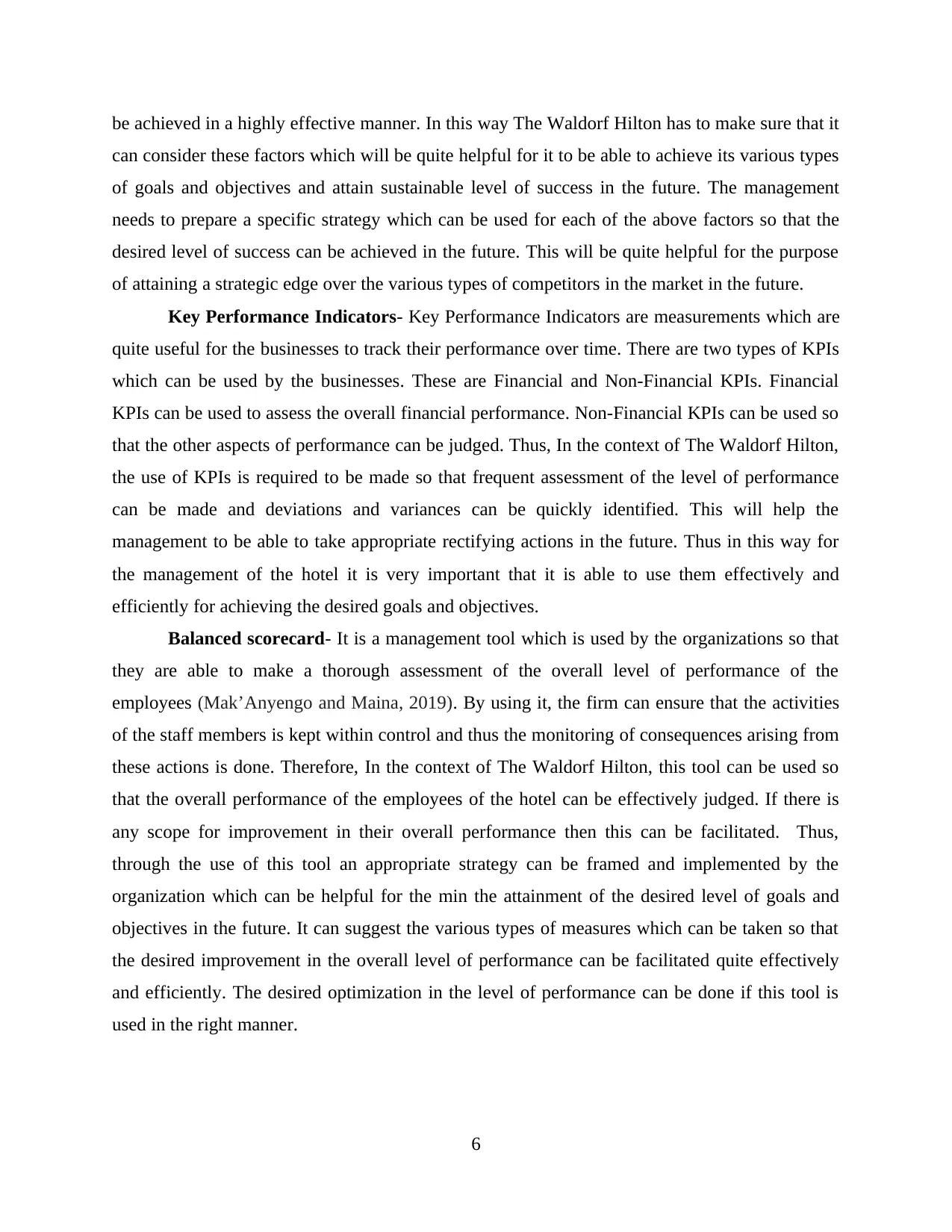
be achieved in a highly effective manner. In this way The Waldorf Hilton has to make sure that it
can consider these factors which will be quite helpful for it to be able to achieve its various types
of goals and objectives and attain sustainable level of success in the future. The management
needs to prepare a specific strategy which can be used for each of the above factors so that the
desired level of success can be achieved in the future. This will be quite helpful for the purpose
of attaining a strategic edge over the various types of competitors in the market in the future.
Key Performance Indicators- Key Performance Indicators are measurements which are
quite useful for the businesses to track their performance over time. There are two types of KPIs
which can be used by the businesses. These are Financial and Non-Financial KPIs. Financial
KPIs can be used to assess the overall financial performance. Non-Financial KPIs can be used so
that the other aspects of performance can be judged. Thus, In the context of The Waldorf Hilton,
the use of KPIs is required to be made so that frequent assessment of the level of performance
can be made and deviations and variances can be quickly identified. This will help the
management to be able to take appropriate rectifying actions in the future. Thus in this way for
the management of the hotel it is very important that it is able to use them effectively and
efficiently for achieving the desired goals and objectives.
Balanced scorecard- It is a management tool which is used by the organizations so that
they are able to make a thorough assessment of the overall level of performance of the
employees (Mak’Anyengo and Maina, 2019). By using it, the firm can ensure that the activities
of the staff members is kept within control and thus the monitoring of consequences arising from
these actions is done. Therefore, In the context of The Waldorf Hilton, this tool can be used so
that the overall performance of the employees of the hotel can be effectively judged. If there is
any scope for improvement in their overall performance then this can be facilitated. Thus,
through the use of this tool an appropriate strategy can be framed and implemented by the
organization which can be helpful for the min the attainment of the desired level of goals and
objectives in the future. It can suggest the various types of measures which can be taken so that
the desired improvement in the overall level of performance can be facilitated quite effectively
and efficiently. The desired optimization in the level of performance can be done if this tool is
used in the right manner.
6
can consider these factors which will be quite helpful for it to be able to achieve its various types
of goals and objectives and attain sustainable level of success in the future. The management
needs to prepare a specific strategy which can be used for each of the above factors so that the
desired level of success can be achieved in the future. This will be quite helpful for the purpose
of attaining a strategic edge over the various types of competitors in the market in the future.
Key Performance Indicators- Key Performance Indicators are measurements which are
quite useful for the businesses to track their performance over time. There are two types of KPIs
which can be used by the businesses. These are Financial and Non-Financial KPIs. Financial
KPIs can be used to assess the overall financial performance. Non-Financial KPIs can be used so
that the other aspects of performance can be judged. Thus, In the context of The Waldorf Hilton,
the use of KPIs is required to be made so that frequent assessment of the level of performance
can be made and deviations and variances can be quickly identified. This will help the
management to be able to take appropriate rectifying actions in the future. Thus in this way for
the management of the hotel it is very important that it is able to use them effectively and
efficiently for achieving the desired goals and objectives.
Balanced scorecard- It is a management tool which is used by the organizations so that
they are able to make a thorough assessment of the overall level of performance of the
employees (Mak’Anyengo and Maina, 2019). By using it, the firm can ensure that the activities
of the staff members is kept within control and thus the monitoring of consequences arising from
these actions is done. Therefore, In the context of The Waldorf Hilton, this tool can be used so
that the overall performance of the employees of the hotel can be effectively judged. If there is
any scope for improvement in their overall performance then this can be facilitated. Thus,
through the use of this tool an appropriate strategy can be framed and implemented by the
organization which can be helpful for the min the attainment of the desired level of goals and
objectives in the future. It can suggest the various types of measures which can be taken so that
the desired improvement in the overall level of performance can be facilitated quite effectively
and efficiently. The desired optimization in the level of performance can be done if this tool is
used in the right manner.
6
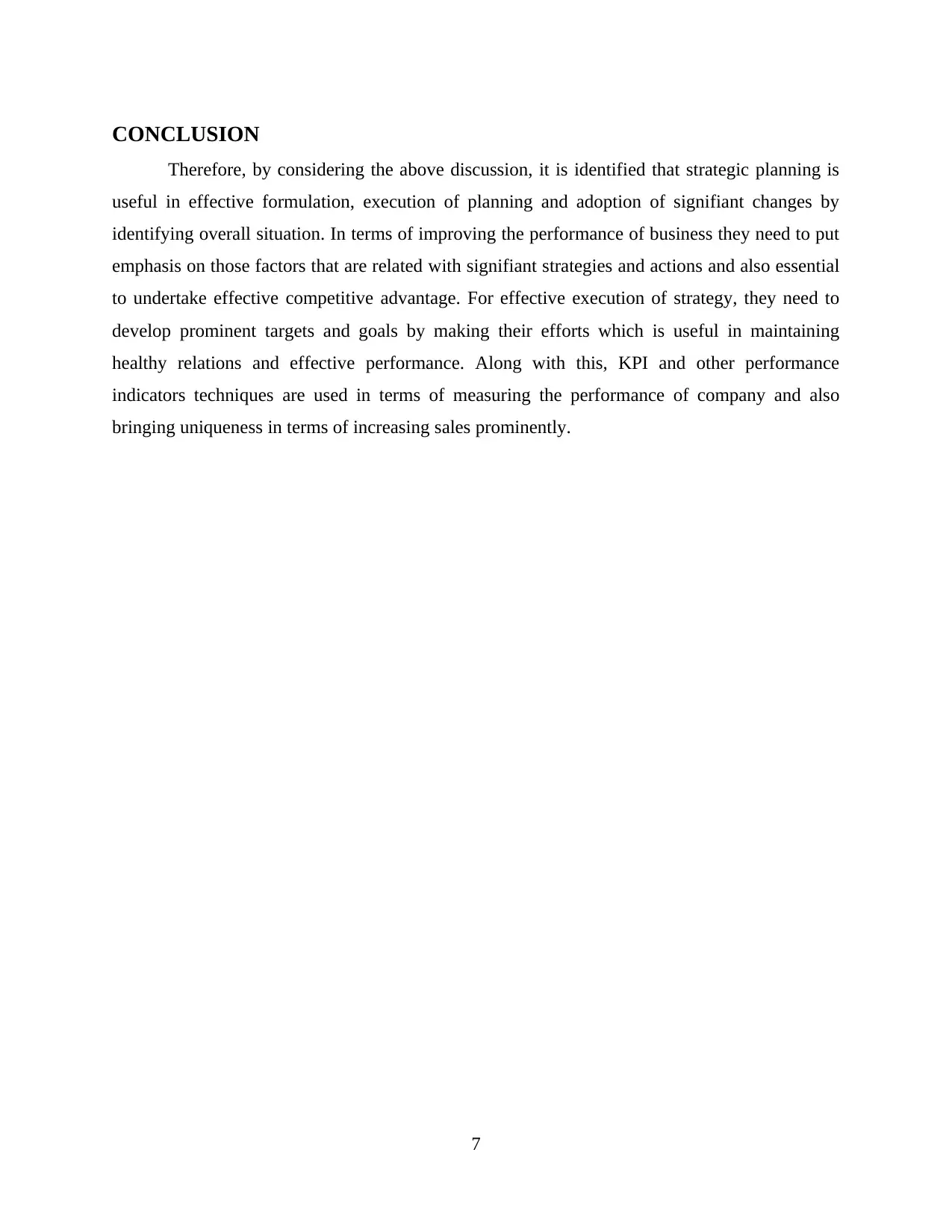
CONCLUSION
Therefore, by considering the above discussion, it is identified that strategic planning is
useful in effective formulation, execution of planning and adoption of signifiant changes by
identifying overall situation. In terms of improving the performance of business they need to put
emphasis on those factors that are related with signifiant strategies and actions and also essential
to undertake effective competitive advantage. For effective execution of strategy, they need to
develop prominent targets and goals by making their efforts which is useful in maintaining
healthy relations and effective performance. Along with this, KPI and other performance
indicators techniques are used in terms of measuring the performance of company and also
bringing uniqueness in terms of increasing sales prominently.
7
Therefore, by considering the above discussion, it is identified that strategic planning is
useful in effective formulation, execution of planning and adoption of signifiant changes by
identifying overall situation. In terms of improving the performance of business they need to put
emphasis on those factors that are related with signifiant strategies and actions and also essential
to undertake effective competitive advantage. For effective execution of strategy, they need to
develop prominent targets and goals by making their efforts which is useful in maintaining
healthy relations and effective performance. Along with this, KPI and other performance
indicators techniques are used in terms of measuring the performance of company and also
bringing uniqueness in terms of increasing sales prominently.
7
⊘ This is a preview!⊘
Do you want full access?
Subscribe today to unlock all pages.

Trusted by 1+ million students worldwide

REFERENCES
Books and Journals:
Bavik, A., 2016. Identification of organizational culture in the hospitality industry. In Tourism
and hospitality management. Emerald Group Publishing Limited.
Bratton, A., 2018. The role of talent development in environmentally sustainable
hospitality. Worldwide Hospitality and Tourism Themes.
Bryson, J.M., Edwards, L.H. and Van Slyke, D.M., 2018. Getting strategic about strategic
planning research.
Crawford, A. and Naar, J., 2016. Exit planning of lifestyle and profit-oriented entrepreneurs in
bed and breakfasts. International Journal of Hospitality & Tourism
Administration. 17(3). pp.260-285.
David, M.E., David, F.R. and David, F.R., 2017. The quantitative strategic planning matrix: a
new marketing tool. Journal of strategic Marketing. 25(4). pp.342-352.
Elbanna, S., 2016. Managers' autonomy, strategic control, organizational politics and strategic
planning effectiveness: An empirical investigation into missing links in the hotel sector. Tourism
Management. 52. pp.210-220.
Elbanna, S., Andrews, R. and Pollanen, R., 2016. Strategic planning and implementation success
in public service organizations: Evidence from Canada. Public Management
Review. 18(7). pp.1017-1042.
Filimonau, V. and Naumova, E., 2020. The blockchain technology and the scope of its
application in hospitality operations. International Journal of Hospitality
Management. 87. p.102383.
Gupta, V., 2019. Talent management dimensions and their relationship with retention of
Generation-Y employees in the hospitality industry. International Journal of
Contemporary Hospitality Management.
Jones, P. and Wynn, M. G., 2019. The circular economy, natural capital and resilience in tourism
and hospitality. International Journal of Contemporary Hospitality Management.
Kasemsap, K., 2017. Promoting Service Innovation and Knowledge Management in the
Hospitality Industry. In Strategic Marketing Management and Tactics in the Service
Industry (pp. 243-279). IGI Global.
Kim, T. and et.al., 2019. Investigating the impact of advertising during economic shocks on firm
performance in the hospitality industry. Journal of Hospitality Marketing &
Management. 28(8). pp.1010-1031.
Lai, I. K. W. and Wong, J. W. C., 2020. Comparing crisis management practices in the hotel
industry between initial and pandemic stages of COVID-19. International Journal of
Contemporary Hospitality Management.
Madanhire, I. and Mbohwa, C., 2016. Enterprise resource planning (ERP) in improving
operational efficiency: Case study. Procedia CIRP. 40. pp.225-229.
Mak’Anyengo, P. A. and Maina, J., 2019. Organizational Learning and Performance of
Hospitality Industry in Kenya: A Case Study of Sarova Whitesands Beach Resort and
Spa. International Journal of Current Aspects. 3(II). pp.117-130.
Manning, L., 2018. The value of food safety culture to the hospitality industry. Worldwide
Hospitality and Tourism Themes.
Mmutle, T., 2017. Customers' perception of service quality and its impact on reputation in the
hospitality industry.
8
Books and Journals:
Bavik, A., 2016. Identification of organizational culture in the hospitality industry. In Tourism
and hospitality management. Emerald Group Publishing Limited.
Bratton, A., 2018. The role of talent development in environmentally sustainable
hospitality. Worldwide Hospitality and Tourism Themes.
Bryson, J.M., Edwards, L.H. and Van Slyke, D.M., 2018. Getting strategic about strategic
planning research.
Crawford, A. and Naar, J., 2016. Exit planning of lifestyle and profit-oriented entrepreneurs in
bed and breakfasts. International Journal of Hospitality & Tourism
Administration. 17(3). pp.260-285.
David, M.E., David, F.R. and David, F.R., 2017. The quantitative strategic planning matrix: a
new marketing tool. Journal of strategic Marketing. 25(4). pp.342-352.
Elbanna, S., 2016. Managers' autonomy, strategic control, organizational politics and strategic
planning effectiveness: An empirical investigation into missing links in the hotel sector. Tourism
Management. 52. pp.210-220.
Elbanna, S., Andrews, R. and Pollanen, R., 2016. Strategic planning and implementation success
in public service organizations: Evidence from Canada. Public Management
Review. 18(7). pp.1017-1042.
Filimonau, V. and Naumova, E., 2020. The blockchain technology and the scope of its
application in hospitality operations. International Journal of Hospitality
Management. 87. p.102383.
Gupta, V., 2019. Talent management dimensions and their relationship with retention of
Generation-Y employees in the hospitality industry. International Journal of
Contemporary Hospitality Management.
Jones, P. and Wynn, M. G., 2019. The circular economy, natural capital and resilience in tourism
and hospitality. International Journal of Contemporary Hospitality Management.
Kasemsap, K., 2017. Promoting Service Innovation and Knowledge Management in the
Hospitality Industry. In Strategic Marketing Management and Tactics in the Service
Industry (pp. 243-279). IGI Global.
Kim, T. and et.al., 2019. Investigating the impact of advertising during economic shocks on firm
performance in the hospitality industry. Journal of Hospitality Marketing &
Management. 28(8). pp.1010-1031.
Lai, I. K. W. and Wong, J. W. C., 2020. Comparing crisis management practices in the hotel
industry between initial and pandemic stages of COVID-19. International Journal of
Contemporary Hospitality Management.
Madanhire, I. and Mbohwa, C., 2016. Enterprise resource planning (ERP) in improving
operational efficiency: Case study. Procedia CIRP. 40. pp.225-229.
Mak’Anyengo, P. A. and Maina, J., 2019. Organizational Learning and Performance of
Hospitality Industry in Kenya: A Case Study of Sarova Whitesands Beach Resort and
Spa. International Journal of Current Aspects. 3(II). pp.117-130.
Manning, L., 2018. The value of food safety culture to the hospitality industry. Worldwide
Hospitality and Tourism Themes.
Mmutle, T., 2017. Customers' perception of service quality and its impact on reputation in the
hospitality industry.
8
Paraphrase This Document
Need a fresh take? Get an instant paraphrase of this document with our AI Paraphraser
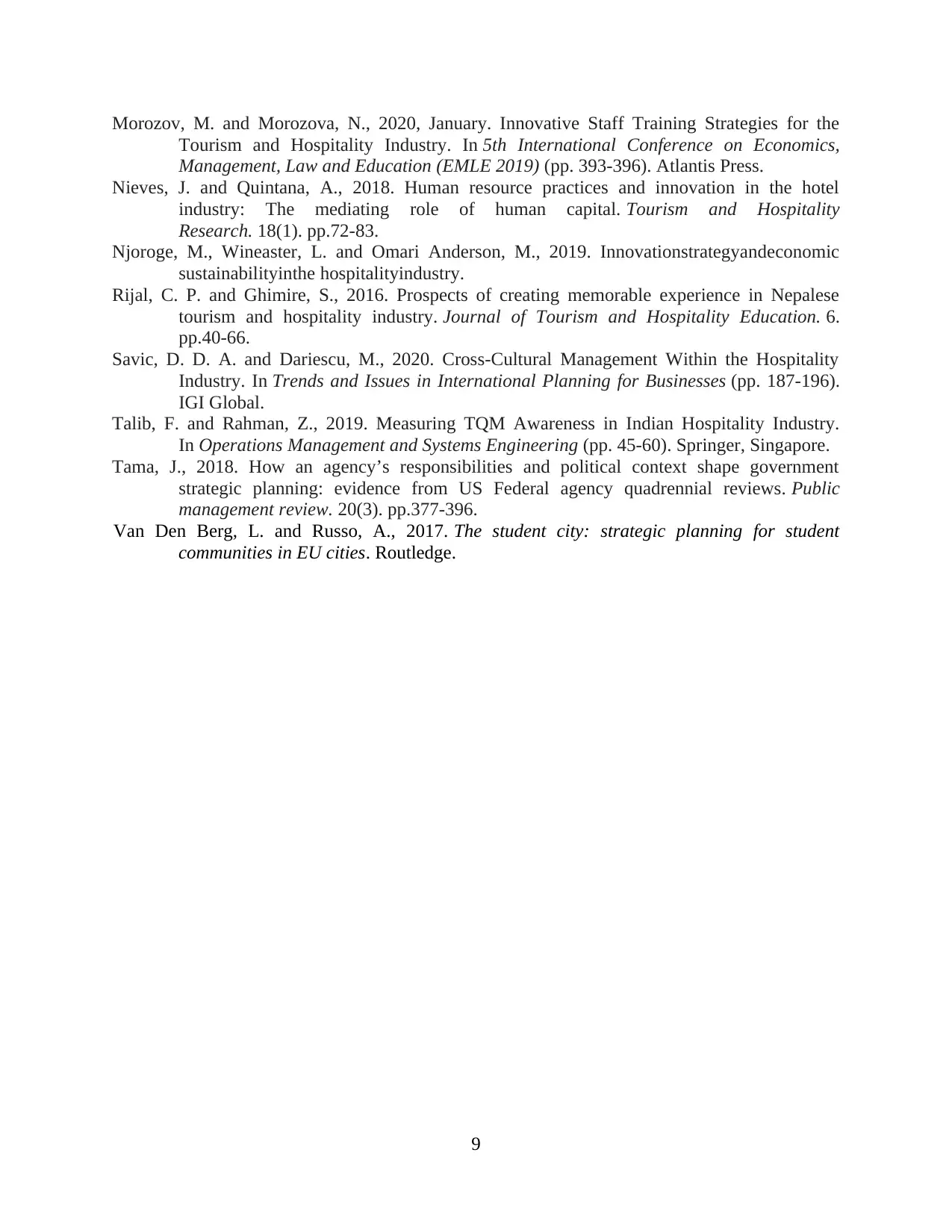
Morozov, M. and Morozova, N., 2020, January. Innovative Staff Training Strategies for the
Tourism and Hospitality Industry. In 5th International Conference on Economics,
Management, Law and Education (EMLE 2019) (pp. 393-396). Atlantis Press.
Nieves, J. and Quintana, A., 2018. Human resource practices and innovation in the hotel
industry: The mediating role of human capital. Tourism and Hospitality
Research. 18(1). pp.72-83.
Njoroge, M., Wineaster, L. and Omari Anderson, M., 2019. Innovationstrategyandeconomic
sustainabilityinthe hospitalityindustry.
Rijal, C. P. and Ghimire, S., 2016. Prospects of creating memorable experience in Nepalese
tourism and hospitality industry. Journal of Tourism and Hospitality Education. 6.
pp.40-66.
Savic, D. D. A. and Dariescu, M., 2020. Cross-Cultural Management Within the Hospitality
Industry. In Trends and Issues in International Planning for Businesses (pp. 187-196).
IGI Global.
Talib, F. and Rahman, Z., 2019. Measuring TQM Awareness in Indian Hospitality Industry.
In Operations Management and Systems Engineering (pp. 45-60). Springer, Singapore.
Tama, J., 2018. How an agency’s responsibilities and political context shape government
strategic planning: evidence from US Federal agency quadrennial reviews. Public
management review. 20(3). pp.377-396.
Van Den Berg, L. and Russo, A., 2017. The student city: strategic planning for student
communities in EU cities. Routledge.
9
Tourism and Hospitality Industry. In 5th International Conference on Economics,
Management, Law and Education (EMLE 2019) (pp. 393-396). Atlantis Press.
Nieves, J. and Quintana, A., 2018. Human resource practices and innovation in the hotel
industry: The mediating role of human capital. Tourism and Hospitality
Research. 18(1). pp.72-83.
Njoroge, M., Wineaster, L. and Omari Anderson, M., 2019. Innovationstrategyandeconomic
sustainabilityinthe hospitalityindustry.
Rijal, C. P. and Ghimire, S., 2016. Prospects of creating memorable experience in Nepalese
tourism and hospitality industry. Journal of Tourism and Hospitality Education. 6.
pp.40-66.
Savic, D. D. A. and Dariescu, M., 2020. Cross-Cultural Management Within the Hospitality
Industry. In Trends and Issues in International Planning for Businesses (pp. 187-196).
IGI Global.
Talib, F. and Rahman, Z., 2019. Measuring TQM Awareness in Indian Hospitality Industry.
In Operations Management and Systems Engineering (pp. 45-60). Springer, Singapore.
Tama, J., 2018. How an agency’s responsibilities and political context shape government
strategic planning: evidence from US Federal agency quadrennial reviews. Public
management review. 20(3). pp.377-396.
Van Den Berg, L. and Russo, A., 2017. The student city: strategic planning for student
communities in EU cities. Routledge.
9
1 out of 11
Related Documents
Your All-in-One AI-Powered Toolkit for Academic Success.
+13062052269
info@desklib.com
Available 24*7 on WhatsApp / Email
![[object Object]](/_next/static/media/star-bottom.7253800d.svg)
Unlock your academic potential
Copyright © 2020–2026 A2Z Services. All Rights Reserved. Developed and managed by ZUCOL.





